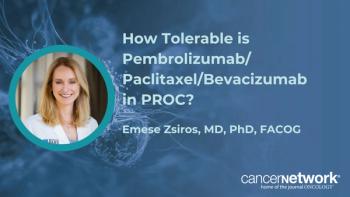
Oncology NEWS International
- Oncology NEWS International Vol 5 No 1
- Volume 5
- Issue 1
Study Suggests Foscarnet Might Be Useful in Kaposi's Sarcoma
SEATTLE--DNA from the recently discovered Kaposi's sarcoma-associated herpesvirus (KSHV) has been isolated in KS lesions as well as some AIDS-related lymphomas, and the new research suggests that foscarnet (Foscavir) may effectively inhibit the virus. Enrique. A. Mesri, PhD, of the Department of Medicine, Cornell University Medical College, reported the findings at the American Society of Hematology (ASH) meeting.
SEATTLE--DNA from the recently discovered Kaposi's sarcoma-associatedherpesvirus (KSHV) has been isolated in KS lesions as well assome AIDS-related lymphomas, and the new research suggests thatfoscarnet (Foscavir) may effectively inhibit the virus. Enrique.A. Mesri, PhD, of the Department of Medicine, Cornell UniversityMedical College, reported the findings at the American Societyof Hematology (ASH) meeting.
Dr. Mesri and his colleagues at Cornell and Memorial Sloan-Ketteringfound a DNA fragment from KSHV in a high percentage of both AIDS-relatedand non-AIDS-related Kaposi's sarcoma lesions. The DNA fragmentwas also found in cells from AIDS-related body cavity-based B-celllymphomas (AIDS-BCBL).
The KSHV+ DNA found in BC-1 cells (a cell line established froman AIDS-BCBL patient and the first cell line known to stably carryKSHV-DNA) was protected from DNAse degradation, possibly, theresearchers concluded, by being inside a viral capsid.
They also found that KSHV shared DNA homology with Epstein-Barrvirus and herpesvirus-Saimiri, both lympho-trophic herpesviruses,Dr. Mesri said.
Further studies found that the KSHV+ viral particles were infectiveand could transmit KSHV-DNA to human CD19+ B lymphocytes in culture.This in vitro infection could be blocked by the viral DNA-polymeraseinhibitor foscarnet, as well as by ultraviolet irradiation, indicatingthat transmission and persistence of KSHV-DNA is dependent ona biologically active replicating virus.
Dr. Mesri and his colleagues plan to pursue the potential of foscarnet,currently approved by the FDA for the treatment of CMV retinitis,as a treatment for Kaposi's sarcoma and AIDS-related body cavity-basedB-cell lymphomas.
Articles in this issue
about 30 years ago
HCFA Reevaluations May Affect Chemo Administration Cost Codesabout 30 years ago
Breast Cancer Info Now on Internetabout 30 years ago
HDC/ABMT Has Benefits in Multiple Myelomaabout 30 years ago
Reporting of Study Comparing Casodex, Eulexin Is Questionedabout 30 years ago
Limits on Tamoxifen Duration Questionedabout 30 years ago
ACRO Forecasts Radiologist Surplusabout 30 years ago
Potency Status Before RT, Not Dose, Determines Post-RT Functionabout 30 years ago
Dr. Klausner Outlines Goals for NCIabout 30 years ago
Difficulties in Translating Relative Risks Into Absolute RiskNewsletter
Stay up to date on recent advances in the multidisciplinary approach to cancer.










































